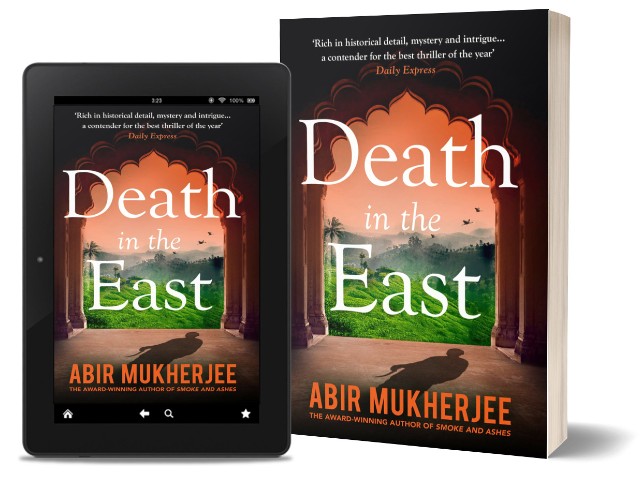Murder mysteries and detective fiction are some of our favorite genres when it comes to fiction and so books falling into this class are always on our reading list. One of the contemporary writers we like is Abir Mukherjee and we have reviewed his Sam Wyndham and Surendranath Banerjee series here:
| Book Title | : | Death in the East |
| Author | : | Abir Mukherjee |
| Published by | : | Vintage Digital ( 14November 2019) |
| # of Pages | : | 432 (Paperback) 6125 KB; 421 (Kindle EBook) 352 (Hardcover) |
| Purchase Link(s) | : |
|
Published in 2019, it is the writer’s take on a ‘closed door’ murder mystery, but more than that it is a book about finding sanity and tolerance in midst of our world that seem to become angrier and intolerant every day. We enjoyed reading this installment featuring another intriguing mystery and here are is our review of the book on behalf of Team ThinkerViews.
This Is Here In For You
Book Cover:
Let us take a look at the cover page of this book, the gateway to the fictional story explored within.

Death in the East by Abir Mukherjee | Book Cover
The book has different covers for different versions. Here are a couple of them. They are quite different. Actually, the newer version is visually more appealing. The scene where you are looking at the green landscape from the window of a monument makes the cover page look rich. The simple and elegant fonts used for the title makes it look sober, and the white color adds to that.
It is simple and effective. However, it looks little sketchy (instead of real).
There is one more version where there is a fellow looking at similar landscape from the door of a different monument. The design as well as the fonts are even more attractive in that version
Storyline:
It is February 1922 and Sam Wyndham has now been in India for nearly four years. The events depicted in the previous book brought Sam in conflict with the military intelligence and he is very aware now what a weakness his opium addiction presents to such enemies. Things have been going from bad to worse all around him while he has passed years through the opium haze and so he decides to try a remedy that will cure him of his addiction – he visits a remote ashram located in Jatinga, Assam. Here, Devraha swami cures addicts of their dependence on the drugs.
But when Sam arrives in Jatinga, he sees a ghost from the past.
While he goes through the agonising treatment at the ashram that leads to him wandering at nights, he comes very close to death. Only this time the victim is another addict staying in the ashram who looks a fair bit like Sam. While Sam is trying to determine whether there is a plot to hunt him down or whether it is just paranoia caused by opium or lack thereof, the case ends with no particular evidence of foul-play.
After seven days at the ashram, Sam is allowed to leave, but asked to stay close during his recuperation. He ends up the house of local civil engineer Mr. Preston, and freshens up his acquaintance with beautiful Mrs. Emily Carter, whose husband is the richest and most powerful man all around here.
That night, Sam is invited to the annual club dinner and witnessed the supernatural spectacle of thousands of starlings flinging themselves from the sky and into the valley of death that is Jatinga.
Spooked already, when Sam enters the dining room, he finds that Mr. Carter is a man he knew in London. In February of 1905, he met Jeremiah Caine and was part of a disastrous chain of events that led to three innocent people dying while Jeremiah Caine got away with murder.
Predictably, Carter orders his men to murder Sam Wyndham, but Sam survives. When Sam comes to arrest Carter the next morning though, he finds a dead body, in a locked room. The bizarre co-incidental similarities of this murder with the 1905 murders are too much for Sam and he is happy to have Surendranath coming in at this stage and taking over murder inquiries for Carter.
Was Carter’s death some sort of natural justice for lifetime of crimes? Or was it performed by supernatural means as it appears on face value? Is Surendranath Banerjee altered so much that their partnership is no longer going to work as it has in past? When faced between following the right procedure and doing what they think is right, what will they chose?
Views And Reviews:
The popular trend today is for the authors to weave two different stories and timelines – generally featuring two protagonists. This book is cleverly constructed along the same lines by using a flashback from Sam Wyndham‘s early days as a constable in London of 1905 and his present day struggles as a Captain of the Imperial Police Force in India, as he visits Assam of 1922. Seventeen years apart, the stories progress on their own, until they converge. This gives the author to make most of the book almost like stand-alone murder mystery set in East London of 1905.
And that part is more enjoyable than the present day story as it comprises the strong elements of murder mysteries, thugs, corrupt businessman, opportunistic journalism and all-around misery of that time in East London. Sam learns quickly, but nowhere does the author make him perfect. We also have the advantage of seeing this time through the experienced eyes of Sam, who looks back on himself and shows us all nooks and crannies of his character – faults, vanity, ambitions, stupidity and all.
Sam’s journey all the way from 1905 – 1922 has taken him to dark places. As Surendranath points out in one of the funniest conversations in the book, people tend to die around Sam. Neverthless, while it might be considered an inevitable fate of a policeman to witness the brutalities of human nature more than most, Sam has an ingrained drive to look for the truth, no matter where it takes him. He doesn’t always achieve justice, or win the battle, and really doesn’t have much to show for his years on the force, but he certainly has acquired an understanding of human nature:
Sometimes people were killed for irrational reasons or no reasons at all. I’d come across men murdered for simply looking the wrong way at a chap in the pub; for being in the wrong place at the wrong time; for having the wrong religion, the wrong accent or the wrong bloody surname; or because they were born in a year that made them the correct age to be conscripted and sent to wholesale slaughter.
death was indiscriminate, as random as a lottery. And when your number came up, you’d no option but to shuffle off this mortal coil to whatever, if anything, came next.
His opium addiction has brought him to an Ashram, and while he observes the way of living and worship here, at best he still remains a man without a proclaimed faith. You may call him a cynic, but he really doesn’t hope for the best out of anything any more:
The human mind seeks to make sense out of chaos. How much easier it was to simply ascribe these things to the fates or the gods than to face the truth: the universe is a callous, capricious place, where bad things happen to good people because there is no good reason why they shouldn’t.
If the universe gives you a chance for redemption, you’d bloody well batter take it, because second chances were rare and third chances were non-existent.
It is more than halfway into the book that Surendranath makes an entrance. He has been through a struggling journey of his own, trying to find the right path for himself in the India of 1922, stands up to not only Sam, but also to other Europeans who try to treat him like a servant. It is through watching the changes in Suren that Sam also realizes the hypocrisy of the ruling class:
We liked to think of ourselves as a noble race, the architects of the greatest empire the world has ever known, but our behaviour was still rooted in the narrow-minded mentality of the wet little island whence we came. We wasted an inordinate amount of time and energy on our petty hierarchies and hypocrisies. We were moved to outrage at the though that a man with different shade of skin might have the temerity to eat in the same room as us, all the while blithely dismissing the fact that this was his country and we were the foreigners in it.
Sam and Suren are the main characters for the series, but this book also has a lot of interesting characters as the author builds the world of 1905 London.
As the author says in the note at end of the book, this book was inspired by contemporary events just as much as a classic murder mystery that involves locked door. As UK faced another wave of separatist articles at time of BREXIT, the general reaction of developed nations all around the world to refugees that were washing up on the shores of Europe and have disappeared from news screens on arrival of the pandemic, and the widespread “Black Lives Matter” movement, it all serves as a reminder of how easy it is for us to fall into the mentality of seeing ourselves as part of one group rather than the whole world being one place of peace and unity.
In this book, the author portrays the plight of Jews that were washing up on shores of European countries and eventually East End of London, fleeing the persecution in their home countries and looking for survival, looking for a chance at life. They faced the same feelings from the local population: mistrust, derision, a belief that they were taking away the livelihoods and jobs of the locals and an all-around dislike.
These feelings are still very common all around the world and we tend to find it easier to blame someone else for our troubles than not:
Fear, the same reason men the world over attack anything they don’t understand.
The natural intuition of the Englishman in regards to foreigners. Or to put it another way, I’d rely on deep prejudices, honed over generations.
Maybe it was just easier: to blame someone else, someone different, for all the shit that happened to you. Someone who couldn’t answer back and point out the obvious: that your troubles were mostly caused by people who looked like you, not people who were different.
And so the book is intriguing and contains some pithy observations. The length however, could have been trimmed a bit, around the later segments, where the pace becomes slack. There are also a few proofread errors, for example, on Page 396:
He was about enter, then halted and turned towards me.
This should be:
He was about to enter, then halted and turned towards me.
I did like the set-up of the books, the background and the spooky setting of the evil valley where birds come to die. The author, once again, does a good job of setting up the stage of Indian vs English in the eastern parts of the country.
Summary:
An interesting murder mystery set in London of 1905 as well as Assam of 1922. A recommended read for fans of murder mysteries including fans of the series.
ThinkerViews Rating:
Around 7.5 stars out of 10.
Quick Purchase Links:
- Buy - Death in the East by Abir Mukherjee - Paperback - Amazon IN
- Buy - Death in the East by Abir Mukherjee - Kindle EBook - Amazon IN
- Buy - Death in the East by Abir Mukherjee - Audiobook - Amazon IN
- Buy - Death in the East by Abir Mukherjee - Paperback - Amazon US
- Buy - Death in the East by Abir Mukherjee - Kindle EBook - Amazon US
- Buy - Death in the East by Abir Mukherjee - Audiobook - Amazon US
Over To You:
If you already have read the book do share your remarks and thoughts via comments below. Does this review help you in making your decision to buy or read the book? Do not forget to share this article with your friends over various social networks. Please follow/subscribe us on various Social networks like Twitter, Facebook, YouTube, Spotify, Amazon Prime Music, Audible, and others. And yes, you may like to subscribe to our RSS feeds to get latest updates for the site to land right in your mail box.
 ThinkerViews – Views And Reviews Personal views and reviews for books, magazines, tv serials, movies, websites, technical stuff and more.
ThinkerViews – Views And Reviews Personal views and reviews for books, magazines, tv serials, movies, websites, technical stuff and more.



